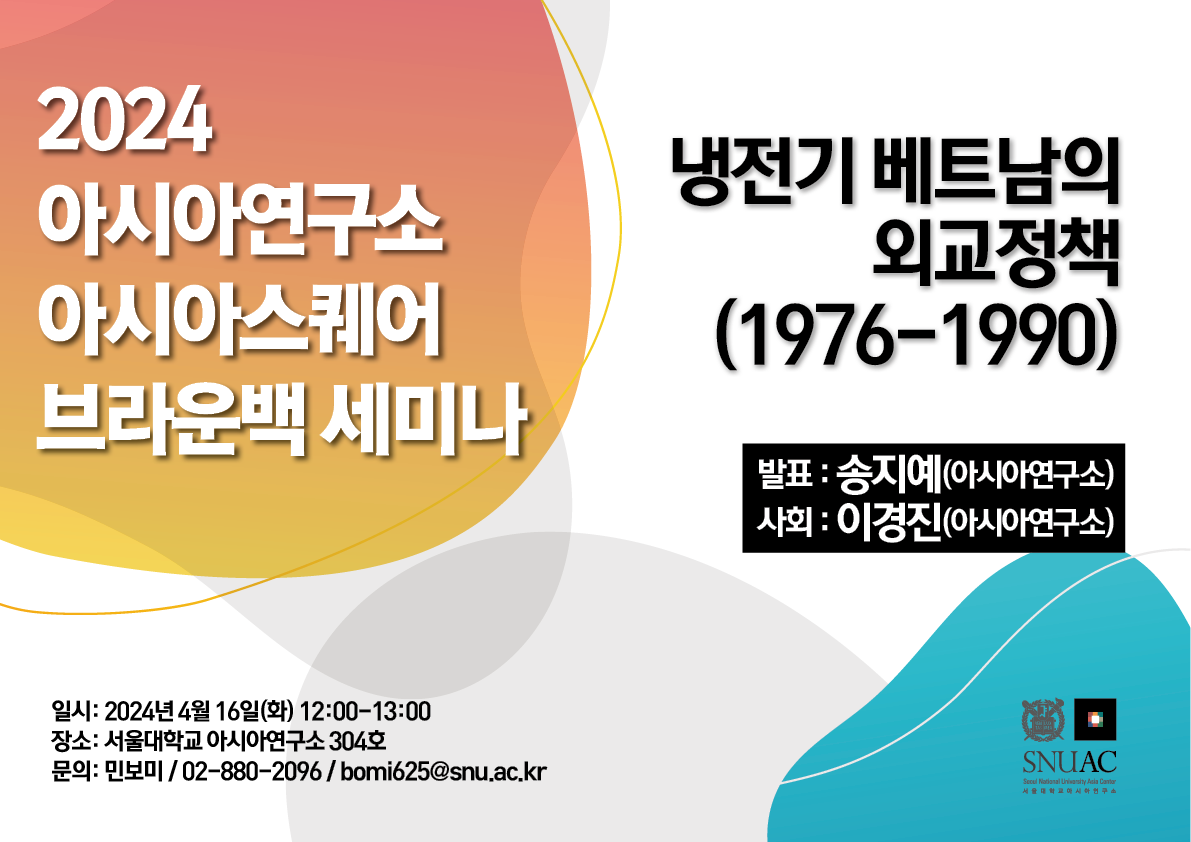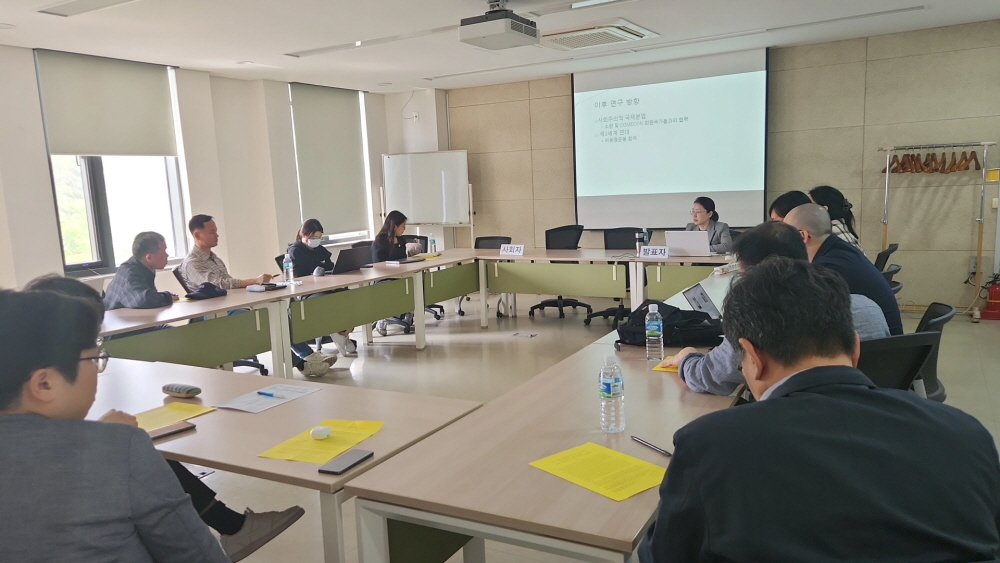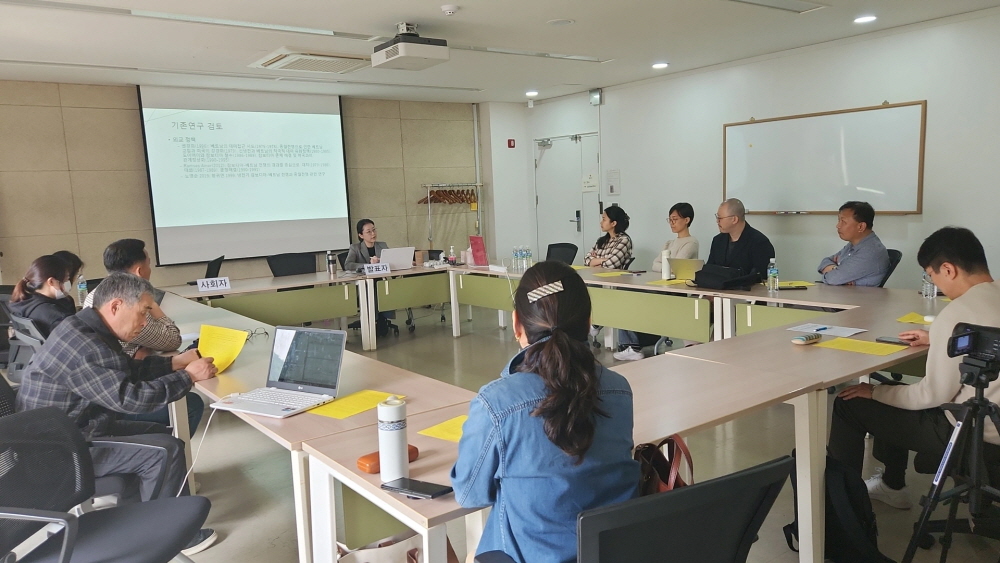Vietnam’s Foreign Policy during the Cold War (1976-1990)
- Date: April 16th, Tuesday, 2024, 12:00 – 13:00
- Location: Room 304, SNUAC (Bldg. 101)
Presenter: Jeeye Song (Visiting Fellow, SNUAC)
Moderator: Kyungjin Lee (Visiting Scholar, SNUAC)
On April 16th, 2024, SNUAC visiting fellow Jeeye Song gave a presentation on “Vietnam’s Foreign Policy during the Cold War (1976-1990)”. It was a time to examine the changes in Vietnam’s diplomatic policy from 1976 to 1990 from the perspective of the Vietnamese Communist Party leadership. The research question focused on understanding how Vietnam’s international political perceptions influenced its diplomatic policies through economic cooperation consultations and non-aligned movements.
Song noted the various directions in Vietnam’s foreign policy shifts, depending on the circumstances, rather than a consistent stance between the liberal and socialist camps. She analyzed the factors of changes in diplomatic policies over time, focusing on major domestic and international events. Furthermore, approaching Vietnam’s Cold War diplomatic policy from an internal perspective aimed to understand how Vietnam’s leadership perceived changes in the international environment, domestic politics, and economic situations, and how internal and external policies were formulated based on these perceptions. Continuing the research, she initially analyzed the Vietnamese Communist Party’s international political perceptions through an examination of reports from Party Congresses. Until 1991, Vietnam held three Party Congresses, including the 4th in 1977, the 5th in 1982, and the 6th in 1987. Based on textual analysis of Congress reports, the presenter discussed how the Party leadership’s views were reflected in diplomatic policies and five-year plans. Additionally, she explored how interpretations of concepts such as Marxism-Leninism, socialist internationalism, socialist international division of labor, and socialist industrialization, as mentioned in the Congress reports, changed over time and manifested in internal and external policies. She also presented findings on how policies resolved at the Party Congress were implemented by reviewing secondary sources.
The presenter pointed out the challenges Vietnam faced domestically after reunification, such as integrating politics and economies between the North and South, transitioning from wartime to peacetime economies, and externally, establishing diplomatic relations with the United States and attracting foreign capital through joining international organizations. She also noted the pressure to clarify diplomatic lines within the communist bloc, especially amid improving US-China relations and deepening Sino-Soviet tensions.
I found the presentation insightful in understanding strategic changes and policy adjustments within the Vietnamese Communist Party, as detected through historic Party Congresses, in response to evolving global geopolitics during and after the Cold War. The presentation provided important insights into how Vietnam continuously reevaluated its strategic priorities and adapted over time. I could delve deeply into changes in perceptions and objectives in international politics and domestic policy and economic strategies. The Vietnamese Communist Party aimed to lead the international spread of socialist revolution, driven by confidence from the victory in the Vietnam War and dedication to the socialist movement. However, over time, especially after the war with China, Party Congresses began emphasizing a more realistic and strategic approach to international relations, as evidenced by seeking new international solidarity movements like the non-aligned movement and improving relations with Western countries. These changes reflected the Party’s strategic intent to diversify Vietnam’s position in global politics and adapt more flexibly. Domestically, while initially aiming for a strong centralized socialist economy, the Vietnamese Communist Party gradually adopted a more pragmatic and inclusive approach to economic policies. Particularly, at the 6th Party Congress, it adopted a revisionist perspective, maintaining a mixed economy to maintain competitiveness in the international economy and seeking more pragmatic and inclusive strategies for internal economic development. I found it fascinating how Vietnam, amidst maintaining its ideological roots, developed essential strategies to adapt and survive in a rapidly changing global environment, interpreting the Party’s policy changes not as mere reactions but as proactive and planned strategic adjustments, providing valuable lessons for long-term sustainable development and enhancing international positioning of the country.
Regarding future research plans or collaboration plans as a visiting scholar at SNUAC, Dr. Song expressed interest in exploring the socialist international division of labor, particularly how cooperation among Soviet and COMECON member countries was conducted. While Vietnam’s membership aimed to establish ties with the Soviet Union, Vietnam considered how it perceived economic benefits regarding international division of labor, and its perceptions of international division of labor were related to its policies towards the GDR. Additionally, she mentioned plans to research Vietnam’s participation in the non-aligned movement, particularly how proactive a role Vietnam played in the Third World solidarity.
– Review by Harin Koo (Academic Reporter, Research Intern)



